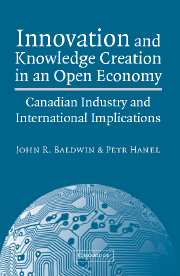 Innovation and Knowledge Creation in an Open Economy
Innovation and Knowledge Creation in an Open Economy Book contents
- Frontmatter
- Contents
- List of Tables and Figures
- Acknowledgments
- 1 The Economics of Knowledge Creation
- 2 The Innovation Survey
- 3 Patterns of Innovation: Intensity and Types
- 4 Sources of Innovations
- 5 Research and Development and Innovation
- 6 Effects of Innovation
- 7 Innovation and Research and Development in Small and Large Firms
- 8 Innovation Regimes and Type of Innovation
- 9 The Use of Intellectual Property Rights
- 10 Multinationals and the Canadian Innovation Process
- 11 Financing and the Cost of Innovation
- 12 The Diffusion of Innovation
- 13 Strategic Capabilities in Innovative Businesses
- 14 Determinants of Innovation
- 15 Summary
- Appendix The Innovation and Advanced Technology Survey
- References
- Index
4 - Sources of Innovations
Published online by Cambridge University Press: 28 August 2009
- Frontmatter
- Contents
- List of Tables and Figures
- Acknowledgments
- 1 The Economics of Knowledge Creation
- 2 The Innovation Survey
- 3 Patterns of Innovation: Intensity and Types
- 4 Sources of Innovations
- 5 Research and Development and Innovation
- 6 Effects of Innovation
- 7 Innovation and Research and Development in Small and Large Firms
- 8 Innovation Regimes and Type of Innovation
- 9 The Use of Intellectual Property Rights
- 10 Multinationals and the Canadian Innovation Process
- 11 Financing and the Cost of Innovation
- 12 The Diffusion of Innovation
- 13 Strategic Capabilities in Innovative Businesses
- 14 Determinants of Innovation
- 15 Summary
- Appendix The Innovation and Advanced Technology Survey
- References
- Index
Summary
INTRODUCTION
Innovation results from complex interactions between the impulse of science and the attraction of the market that provide the strategic innovation options facing a firm. Strategic options appear as opportunities, whose profitability depends on such factors as market conditions, the technological environment, the product life cycle, and the skill of a firm's personnel in technology, management, marketing, and other areas. Science provides a stock of available technological knowledge that is the result of accumulated technical expertise, the transfer of new technologies from others, and the firm's own research and development.
Innovation activity depends crucially on the firm's capability to create and acquire knowledge that not only finds inventions but also brings innovations successfully to the marketplace. This capability rests both on a firm's talent for internal problem solving and on its ability to forge productive external linkages via networks, strategic alliances, and user-producer relationships. The process by which firms acquire and generate knowledge is at the heart of innovation activity.
As with any good, innovation results from the combination of inputs that come from both outside and inside the firm. The knowledge-generation process takes outside knowledge and combines it with the firm's own knowledge. But the difference between innovation and the production of existing goods and services is that innovation involves the generation of a good (knowledge) with special characteristics.
- Type
- Chapter
- Information
- Innovation and Knowledge Creation in an Open EconomyCanadian Industry and International Implications, pp. 63 - 95Publisher: Cambridge University PressPrint publication year: 2003


